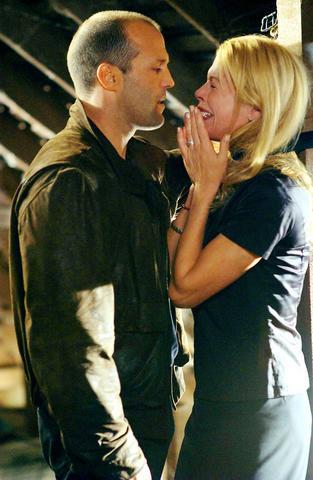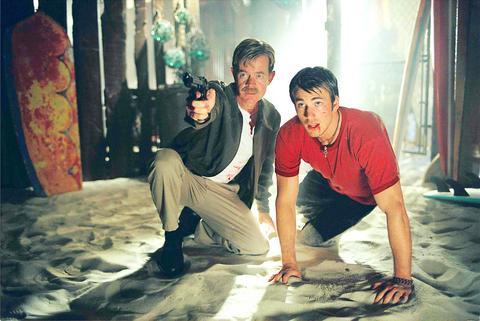One of the many virtues of Cellular, an improbably enjoyable new telecommunications action thriller, is that it wastes very little time on preliminary exposition. Kim Basinger, looking glamorous in a black dress and sunglasses, is walking her young son to the school bus. Their conversation lasts just long enough to establish the crucial information that Basinger's character, Jessica Martin, is a science teacher.
The extra wave goodbye that she and her son exchange is a signal that something bad is about to happen, and a minute later some bald, black-denimed kidnappers kick in the kitchen door of Jessica's elegant Brentwood home, shoot the housekeeper dead and drag Jessica away to a remote safe house in the hills above Los Angeles.

PHOTOS COURTESY FOX MOVIES
All of this happens before you have time to ask how a science teacher can afford a brand-new Porsche Cayenne and a Brentwood mansion with live-in help, or why, on a day when school is in session, this particular science teacher is not at work. (You may also wonder why none of your science teachers looked or dressed like Basinger, but never mind.) But to pose such questions -- and others that arise during the diverting, implausible 89 minutes of Cellular, which opens today nationwide -- is to miss the point and spoil the fun.

PHOTO COURTESY FOX MOVIES
Directed by the talented David Ellis with the same combination of breeziness and rigor that he brought to the underrated teen-scream fright-fest Final Destination 2, Cellular is the kind of movie that has become all too rare in this age of self-important blockbuster bloat. It's an honest, unpretentious, well-made B picture with a clever, silly premise, a handful of sly, unassuming performances and enough car chases, decent jokes and swervy plot complications to make the price of the ticket seem like a decent bargain.
When the chief bad guy, whose name is, of all things, Ethan (Jason Statham), throws Jessica into her attic holding cell, he makes sure to smash the wall phone with a sledge hammer. It's a sturdy old rotary-dial machine, though, so it still works well enough for Jessica to place a random call, which reaches the cellphone of Ryan (Chris Evans), an affable, carefree surfer busy researching bikini styles on the Santa Monica Pier.

According to his ex-girlfriend, Ryan is shallow and self-centered, but he shows remarkable decency and steadfastness in agreeing to help Jessica by staying on the phone until he can find the police.
Needless to say, helping her turns out to be a much more dangerous and complicated proposition, thanks to the vagaries of cellular technology and the unreliability (to say the least) of certain members of the Los Angeles Police Department. Through a series of accidents and misjudgments, Ryan finds himself speeding all over the west side of Los Angeles, from Los Angeles International Airport to Century City and beyond, in a series of borrowed and stolen cars, on the trail of an elaborate and nefarious conspiracy. He also repeatedly collides with the officiousness, selfishness and bad manners of his fellow Angelenos, who force him to take desperate measures like holding up a cellphone store and carjacking an obnoxious lawyer whose vanity license plate is one of the movie's many pieces of whimsical, if somewhat obvious, satirical humor.
Another source of amusement is the presence of William Macy, who plays a henpecked, world-weary veteran cop planning to open a day spa after 27 years on the force. His character may remind you of Robert Duvall's in Falling Down, one of several movies that Cellular either delicately echoes or boldly rips off. Its most obvious resemblance is to Phone Booth, which is hardly a coincidence, since Larry Cohen, the Hollywood renaissance man who wrote that movie, receives a story credit for this one. The script, a model of efficient, on-the-fly exposition, is by Chris Morgan.
The two films might make a fine bicoastal telephonic double feature. Phone Booth, unfolding on a tense day in Times Square, is in part about the paranoia and the itchy intimacy that springs up in New York's crowded, hectic urban environment. Cellular, like Michael Mann's Collateral, is set against the familiar randomness and anomie of the Los Angeles freeway system, but it also has an easygoing, balmy vibe. Ryan's laid-back, lazy friendliness turns out to be the basis of his heroism. When he receives Jessica's call, he really has nothing better to do than help her, and he retains his goofy sense of adventure longer than prudence would dictate. He's having too good a time to take the danger he faces too seriously, and Cellular makes it easy to follow his example.

June 2 to June 8 Taiwan’s woodcutters believe that if they see even one speck of red in their cooked rice, no matter how small, an accident is going to happen. Peng Chin-tian (彭錦田) swears that this has proven to be true at every stop during his decades-long career in the logging industry. Along with mining, timber harvesting was once considered the most dangerous profession in Taiwan. Not only were mishaps common during all stages of processing, it was difficult to transport the injured to get medical treatment. Many died during the arduous journey. Peng recounts some of his accidents in

“Why does Taiwan identity decline?”a group of researchers lead by University of Nevada political scientist Austin Wang (王宏恩) asked in a recent paper. After all, it is not difficult to explain the rise in Taiwanese identity after the early 1990s. But no model predicted its decline during the 2016-2018 period, they say. After testing various alternative explanations, Wang et al argue that the fall-off in Taiwanese identity during that period is related to voter hedging based on the performance of the Democratic Progressive Party (DPP). Since the DPP is perceived as the guardian of Taiwan identity, when it performs well,

A short walk beneath the dense Amazon canopy, the forest abruptly opens up. Fallen logs are rotting, the trees grow sparser and the temperature rises in places sunlight hits the ground. This is what 24 years of severe drought looks like in the world’s largest rainforest. But this patch of degraded forest, about the size of a soccer field, is a scientific experiment. Launched in 2000 by Brazilian and British scientists, Esecaflor — short for “Forest Drought Study Project” in Portuguese — set out to simulate a future in which the changing climate could deplete the Amazon of rainfall. It is

The Taiwan People’s Party (TPP) on May 18 held a rally in Taichung to mark the anniversary of President William Lai’s (賴清德) inauguration on May 20. The title of the rally could be loosely translated to “May 18 recall fraudulent goods” (518退貨ㄌㄨㄚˋ!). Unlike in English, where the terms are the same, “recall” (退貨) in this context refers to product recalls due to damaged, defective or fraudulent merchandise, not the political recalls (罷免) currently dominating the headlines. I attended the rally to determine if the impression was correct that the TPP under party Chairman Huang Kuo-Chang (黃國昌) had little of a